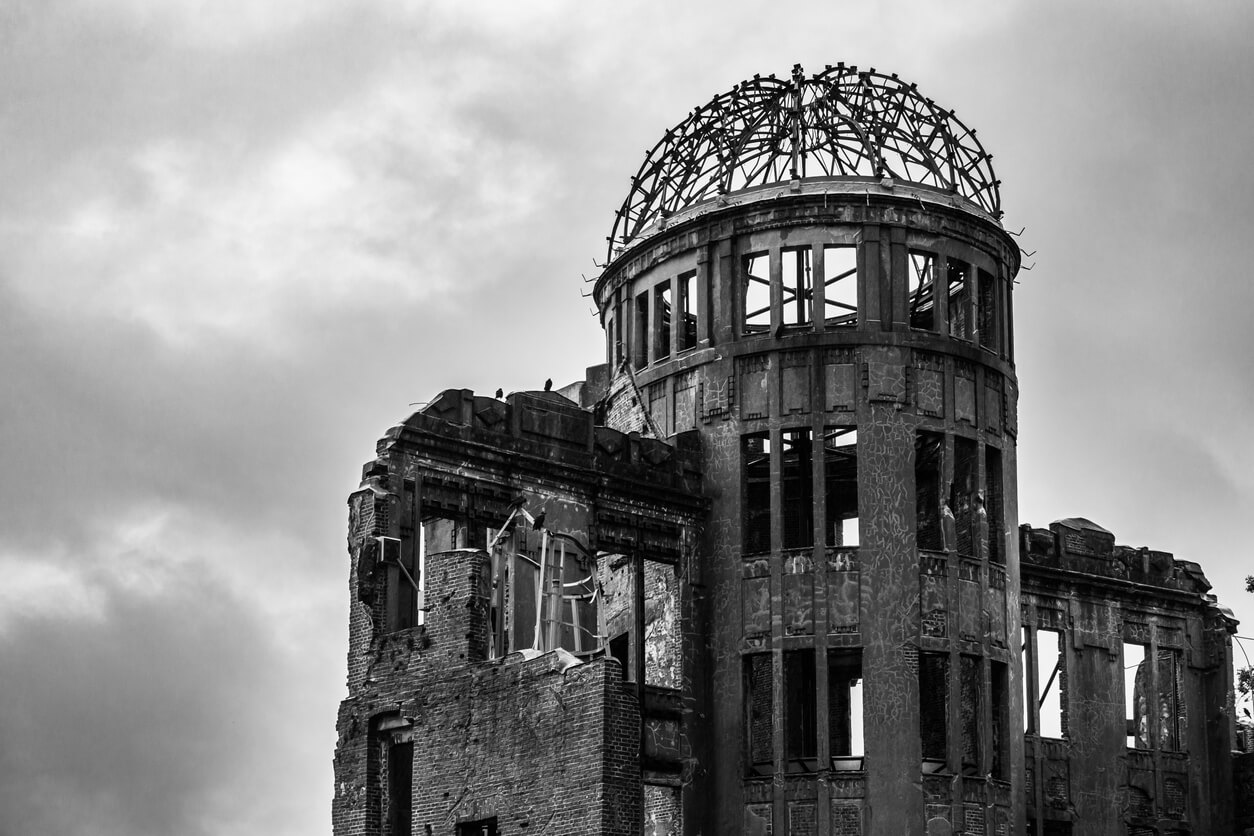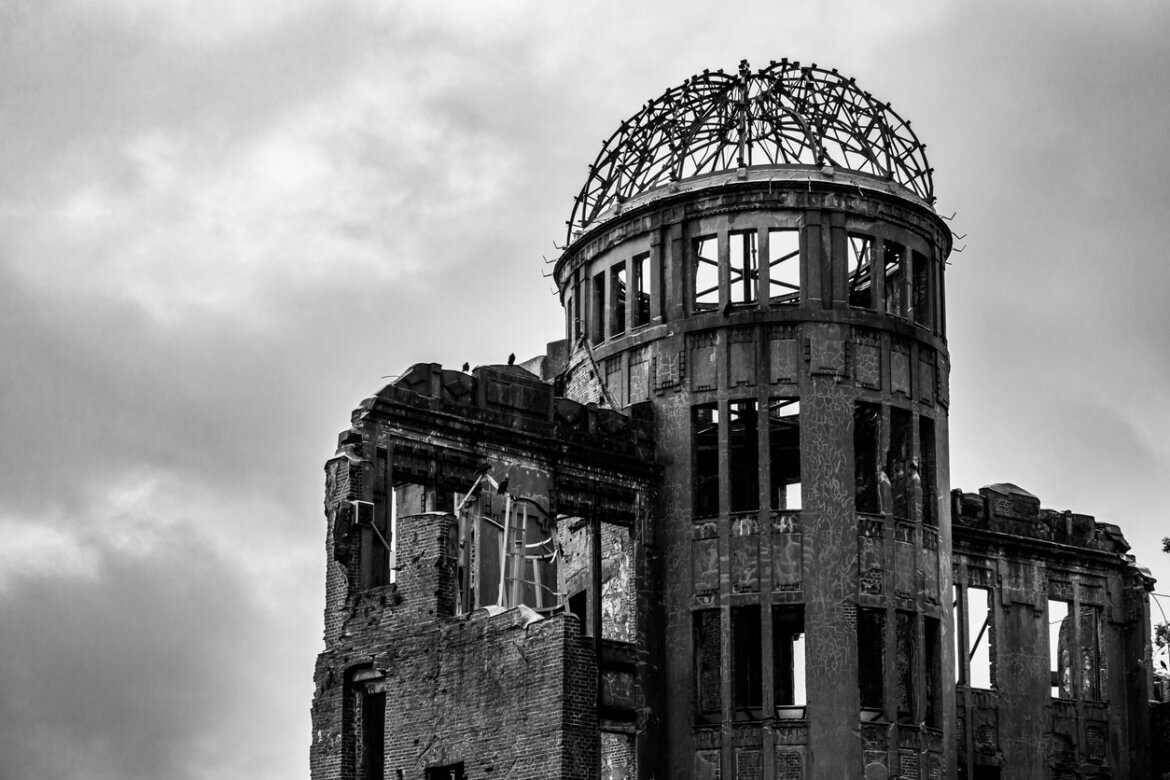Synod/Catholic Stance on Nuclear Weapons
Douglas Roche, Edmonton
Volume 39 Issue 7, 8, & 9 | Posted: October 22, 2024

What is the Catholic Church doing to implement Pope Francis’s teaching in which he condemns the “possession of nuclear weapons”?
The Synod, now concluding its two-year effort to implement Vatican II’s outreach to humanity, should be seized by this question. The shattering of God’s creation through the catastrophic humanitarian consequences of the use of nuclear weapons, increasingly being threatened in today’s toxic political atmosphere, ought to be top of mind. Is it not reasonable for the Synod to challenge the Church as a whole to follow up Vatican II’s rejection of war by addressing the growing threat of nuclear warfare?
The Synod wants to “foster paths of reconciliation, hope, justice and peace.”
A prerequisite to achieving this is to ensure global security. There is no greater threat to security than the continued existence of 12,500 nuclear weapons possessed by nine states.
The Church cannot, of course achieve nuclear disarmament by itself, but it can raise its voice, crying out to the political leadership around the world to fulfil their duty to initiate comprehensive negations towards the elimination of nuclear weapons. Unfortunately, the Church is split as the Canadian Catholic bishops and the American Catholic bishops dramatically show.
To understand the split among Catholics, we need to uncover some background.
»»»»
A new nuclear arms race has broken out and the major powers are ignoring a desperate plea by U.N. Secretary-General Antonio Guterres for a concerted drive by all countries to lessen the risk of nuclear Armageddon. “An accidental launch is one mistake, one miscalculation, one rash act away,” Guterres has warned.
How long can a humanity that aspires to implement the agenda for peace, countenance the military doctrine of nuclear deterrence? Under this doctrine, the retaliatory capacity of a state possessing nuclear weapons is supposed to deter an aggressor from a first strike nuclear attack. Nuclear deterrence drives the nuclear arms race. So a moral position that merely condemns the use of nuclear weapons is insufficient: it is the possession of nuclear weapons that lies at the heart of nuclear morality.
From the time of the Second Vatican Council until 2017, the Catholic Church’s position on possession was ambiguous. One of the Council’s principal documents, the Pastoral Constitution on the Church in the Modern World, said:“ Any act of war aimed indiscriminately at the destruction of entire cities or of extensive areas along with their population is a crime against God and man himself. It merits unequivocal and unhesitating condemnation.”
Though they elaborated their concern that a universal public authority be put in place to outlaw war, the Fathers of Vatican II rather grudgingly accepted the strategy of nuclear deterrence. The accumulation of arms, they said, serves “as a deterrent to possible enemy attack.” Thus “peace of a sort” is maintained, though the balance resulting from the arms race threatens to lead to war, not eliminate it.
In a message to the U.N. Second Special Session on Disarmament in 1982, Pope John Paul II stated: “In current conditions, ‘deterrence’ is based on balance, certainly not as an end in itself but as a step on the way towards a progressive disarmament, may still be judged morally acceptable. Nonetheless, in order to ensure peace, it is indispensable not to be satisfied with the minimum, which is always susceptible to the real danger of explosion.”
In John Paul II’s statement, it is readily seen that deterrence, in order to be acceptable, must lead to disarmament measures. Consequently, deterrence as a single, permanent policy is not acceptable. The American Bishops’ 1983 Pastoral Letter on War and Peace took up this theme. Though the bishops expressed a strong “no” to nuclear war, declaring that a nuclear response to a conventional attack is “morally unjustifiable,” and were skeptical that any nuclear war could avoid the massive killing of civilians, the bishops gave a “strictly conditioned moral acceptance of nuclear deterrence.”
In 1997, the Church’s position began to change. The Holy See’s Permanent Representative at the U.N., Archbishop Renato Martino, told the Committee on Disarmament: “Nuclear weapons are incompatible with the peace we seek for the 21st century. They cannot be justified. They deserve condemnation.”
In 1998, seeing the institutionaliz-ation of nuclear deterrence taking place, 75 U.S. Catholic Bishops signed a statement criticizing the U.S. for moving beyond original nuclear deterrence policies “to which we grudgingly gave our moral approval in 1983.” They added: “Nuclear deterrence as a national policy must be condemned as morally abhorrent because it is the excuse and justification for the continued possession and further development of these horrendous weapons.”
The Holy See position continued to tighten. In 2014, Pope Francis stripped away any lingering moral acceptance of nuclear deterrence: “Nuclear deterrence and the threat of mutually assured destruction cannot be the basis for an ethics of fraternity and peaceful coexistence.” At a 2017 Vatican conference on nuclear weapons, Pope Francis “firmly condemned…their very possession.” The strong language the Pope used in speaking out against the “mentality of fear” and “false sense of security” that drive the new nuclear arms race captured the attention of scores of government diplomats and journalists.
The adoption at the U.N. earlier that year of a Treaty on the Prohibition of Nuclear Weapons gave Pope Francis the opening he needed. The Treaty, which stigmatized such weapons and put them completely outside international humanitarian law, was a direct attack on the possession of nuclear weapons. The U.S., along with its nuclear partners, the U.K. and France, and its client NATO states are determined to ignore the Prohibition Treaty. As if to underscore the Pope’s point, the Holy See was among the first states to sign the new Treaty, which has so far been ratified by 70 states.
»»»»
How has this changed position by the Holy See been received? In Canada, the Conference of Catholic Bishops issued a formal statement strongly backing Pope Francis’s condemnation of possession. They added: “We therefore make a special appeal to the Government of Canada to sign the Treaty on the Prohibition of Nuclear Weapons.”
But the American Catholic bishops, divided among themselves, have been silent. Conscious of their own government’s determination to not only keep but modernize nuclear stocks, they have been unable to move forward in line with Francis and have even declined to join with other religious groups in supporting the Back From the Brink campaign, a coalition of civil society groups calling on the U.S. government to take basic steps toward nuclear disarmament.
At a recent Catholic-sponsored forum in New Mexico (where the first atomic bomb was developed) showed, the Catholic tepidity was on display. The forum could not even endorse the Treaty on the Prohibition of Nuclear Weapons despite the leadership of the Holy See.
European bishops are also split, some in Western Europe supporting the Pope while others in Eastern Europe still hold onto nuclear deterrence. Even the Oxford Handbook of Vatican II, published by Oxford University Press in 2023, lacks a correct interpretation of what Pope Francis said in his condemnation. The treatment of the Church’s policy on nuclear disarmament, as contained in Chapter 38: “Catholicism and International Affairs Since Vatican II,” by Matthew A. Shadle is both misleading and wrong and does a disservice to the courageous stand Pope Francis took in 2017.
All this is the international atmosphere in which the Synod is operating. The Synod ought to give resounding backing to Francis’s brave stand on behalf of the whole world. We will soon see how much support the Pope receives.
Former Senator Douglas Roche’s latest book is “Keep Hope Alive: Essays for a War-free World” (Amazon).
Douglas Roche, Edmonton

